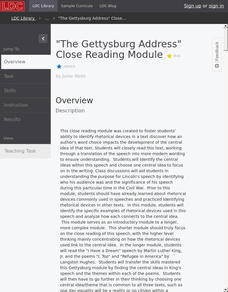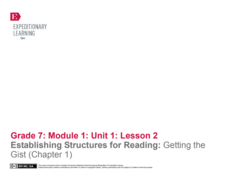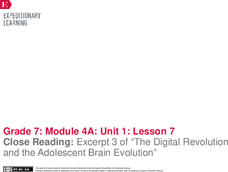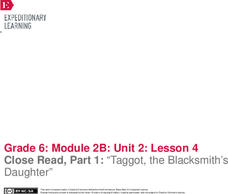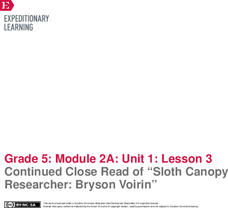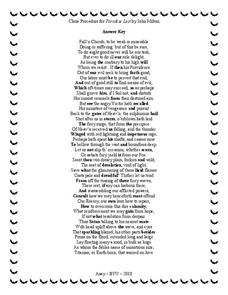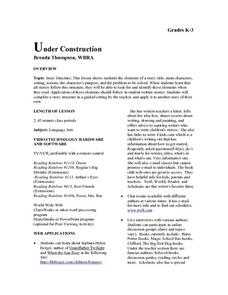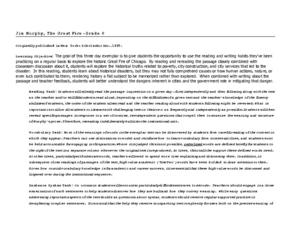Literacy Design Collaborative
"The Gettysburg Address" Close Reading Module
It's time to think deep and narrow. Scholars focus close reading on one short text but task take their thinking to a deep level. Readers use a Rhetorical Analysis Chart to analyze The Gettysburg Address and determine how Lincoln used...
EngageNY
Close Reading: Paragraphs 2 and 3 of “Refugee and Immigrant Children: A Comparison” and Introducing the NYS Expository Writing Rubric
What factors make adaptation successful for refugee and immigrant children? The class explores the topic by reading two paragraphs from "Refugee and Immigrant Children: A Comparison." Next, they engage in a think-pair-share to discuss...
EngageNY
Close Reading: Paragraph 1 of “Refugee and Immigrant Children: A Comparison” (from “Refugee Children in Canada: Searching for Identity”)
What common challenges do refugees and immigrants face? Using the 9th lesson plan from the 20-part Grade 8 ELA Module 1, Unit 2 series, pupils read about the similarities between refugees' and immigrants' adaptation processes. Partners...
EngageNY
Establishing Structures for Reading: Getting the Gist (Chapter 1)
Class members review expectations for successful discussions before reading chapter one of A Long Walk to Water by Linda Sue Park. They engage in a think-pair-share to discuss the gist of the text and add their thoughts to their Readers'...
EngageNY
Practicing Structures for Reading: Gathering and Using Evidence to Analyze Salva’s and Nya’s Points of View (Chapter 4)
Class members discuss the gist of chapter four of A Long Walk to Water by Linda Sue Park with a partner and share their responses with the class. Next, they complete graphic organizers to answer text-dependent questions based on a close...
EngageNY
Close Reading: Excerpt 3 of “The Digital Revolution and the Adolescent Brain Evolution”
It's time to level up and discover how video games affect the brain. Pupils explore the topic as they continue reading excerpts from an article about adolescent brain development and the digital revolution. Scholars also participate in a...
EngageNY
Inferring about Character: Close Reading of The Lightning Thief (Chapter 3)
Stick it to them! Scholars work to write the gist of sections of text on sticky notes and place them in chapter three of The Lightning Thief. They then share what they wrote with classmates in their triad. The group reads selections of...
EngageNY
Close Read, Part 1: “Taggot, the Blacksmith’s Daughter”
There would be no luck if it were not for bad luck. Scholars take a close look at the theme of adversity through multiple reads of Taggot, the Blacksmith’s Daughter. They place sticky notes on important details of the story and complete...
EngageNY
Continued Close Read of “Sloth Canopy Researcher: Bryson Voirin”
Let's explore the rainforest by studying its inhabitants. Pupils continue reading an interview with a sloth scientist and answer text-dependent questions. Next, they engage in a class discussion to share the new facts they learned about...
EngageNY
Research: Close Read of Text 2 for Each Expert Group
Pass the chalk! Pupils participate in a Chalk Talk activity to synthesize information from multiple texts about Roberto Clemente and Althea Gibson. Scholars also read an informational article about one of the athletes, searching for...
EngageNY
Research: Close Read of Text 3 for Each Expert Group
How do athletes break barriers? Pupils consider the question as they continue looking for evidence to support their opinions about how their chosen athlete created a legacy. In small groups, they read an informative article about either...
EngageNY
Research: Close Read of Text 1 for Each Expert Group
Take a closer look to determine the legacy. Learners participate in a close reading of an informational text about either Roberto Clemente or Althea Gibson. Next, they determine how their athlete broke barriers and created a legacy,...
ReadWriteThink
Captioning the Civil Rights Movement: Reading the Images, Writing the Words
Scholars boost their knowledge of the Civil Rights Movement with a instructional activity that challenges writers, readers, and historians to analyze primary sources and caption their observations. By way of reading, writing, discussion,...
Curated OER
The Important Thing About Reading
Third through fifth graders discover the importance of reading and plan a service project to provide books to children. First, they read the book The Important Book and then they brainstorm about the importance of reading. Afterward,...
Curated OER
Paradise Lost: Cloze Procedure
Readers participate in a cloze procedure of John Milton’s Paradise Lost. A detailed rationale of and directions for using the procedure are included with the passage template.
Student Achievement Partners
"The Glorious Whitewasher" from The Adventures of Tom Sawyer by Mark Twain with Mini-Assessment
It's the classic scene: Tom Sawyer is whitewashing a fence. Expose your learners to Mark Twain's humor while reinforcing reading comprehension. Eighth graders are encouraged to read and reread, achieving as much exposure to the text...
Curated OER
What Do You See at the Pond?
With What Do You See at the Pond?, young readers explore pond life and practice reading strategies. Learners first make predictions and then read the simple story independently. After a second read-through with a partner, kids come...
Florida Center for Reading Research
Word Steps
Blending basic CVC letters to make words is one of the first steps to independent reading. Provided here are several images of stairs and several letters to cut and arrange. The learner rearranges the letters to form CVC patterns, sounds...
Curated OER
Under Construction
Young readers examine the elements of story structure that are included in all stories. They include these elements in their own written pieces. This phenomenally-designed plan has everything you need to easily implement it in your...
Curated OER
Jim Murphy, The Great Fire - Grade 6
The Great Fire by Jim Murphy provides the text for a study of the Chicago fire of 1871. The plan is designed as a close reading activity so that all learners have the same background information require for writing. Richly detailed, the...
Curated OER
Caves
Explore caves with your class! Your scholars will participate in scientific observation, research, inference and deduction, reading, vocabulary, and writing activities about caves with this lesson plan. This resource contains five...
Curated OER
Do You Want to Be My Friend?
Learners participate in a variety of emergent and early-literacy activities based on a "friendship" theme. Learners listen to the book Do You Want to Be My Friend by Eric Carle, then echo read, choral read, and independently read...
Curated OER
The Monkey's Paw
In this reading comprehension worksheet, young scholars complete a variety of activities which demonstrate understanding of the book The Monkey's Paw .
Curated OER
Answering Carnival Questions with the Scientific Method
Through the use of a Reading Rainbow episode, clever in-class games and activities, and an ITV Series video, second and third graders engage in a study of the scientific method; what it is, and how scientists use it. This well-designed...
Other popular searches
- Reading Comprehension
- Fluency
- Guided Reading
- Reading Fluency
- Reading Fluency Passages
- Reading Strategies
- Shared Reading
- Reading Fluency Games
- Choral Reading
- Guided Reading Comprehension
- Reading Comprehension Skills
- Map Reading
